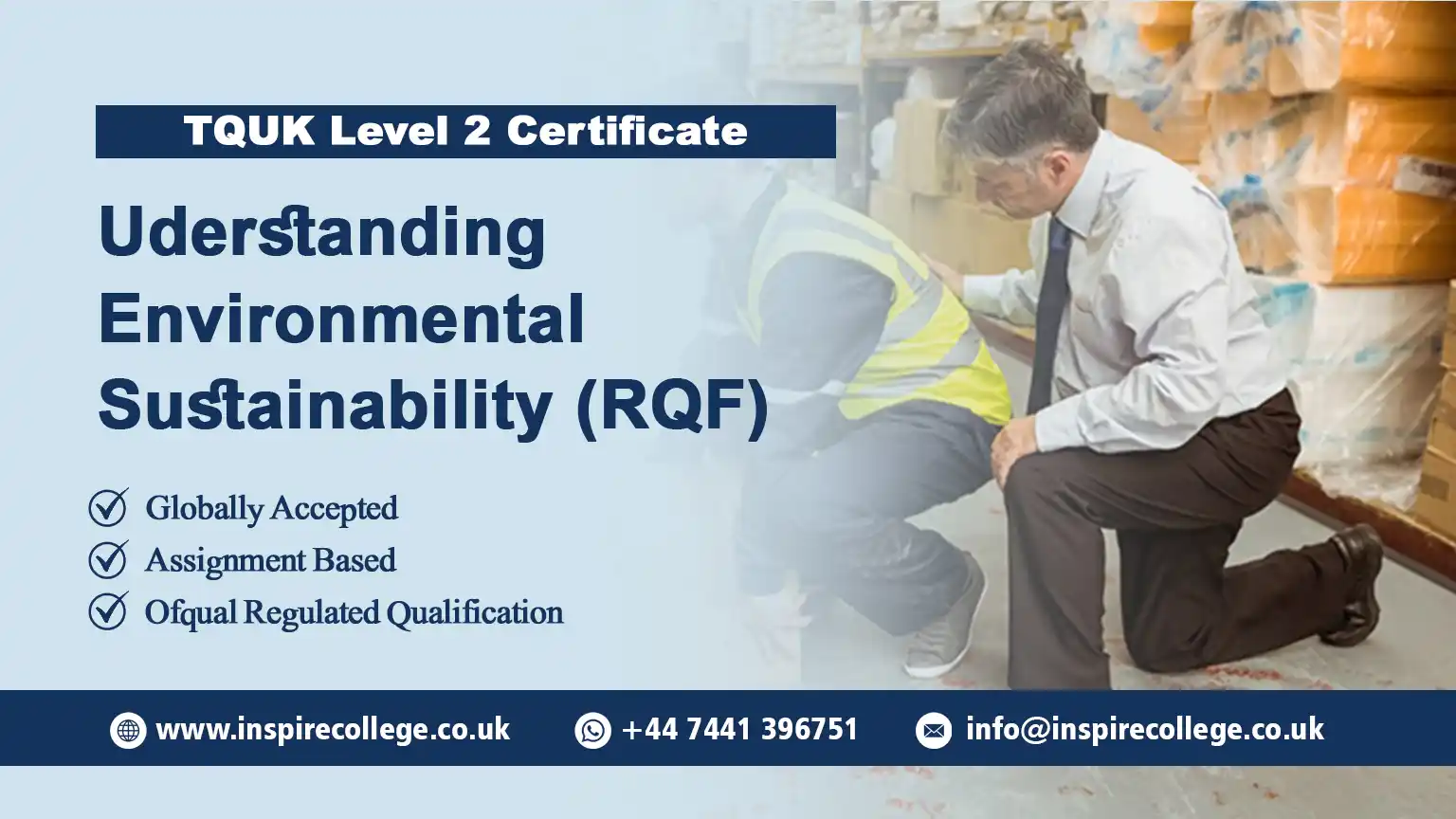
TQUK Level 2 Certificate in Understanding Environmental Sustainability (RQF)
Unveil the secrets of sustainability with the TQUK Level 2 Certificate, your gateway to understanding environmental sustainability. Developed by Training Qualifications UK (TQUK), this certificate equips you with the knowledge and skills needed to navigate the complexities of sustainability in today’s world.
TQUK’s Level 2 Certificate stands out for its comprehensive curriculum, covering everything from the fundamentals of environmental sustainability to global challenges and practical solutions. Delve into the intricacies of sustainable practices, legislation, and impact assessment under the guidance of industry experts passionate about making a difference.
Engage in hands-on learning experiences, interactive activities, and real-world scenarios that breathe life into sustainability concepts. Whether you prefer traditional classroom settings or the flexibility of online learning, TQUK offers options tailored to your schedule and preferences.
Upon completing the TQUK Level 2 Certificate, you’ll emerge equipped with a holistic understanding of environmental sustainability principles and practices. Gain insights into pressing environmental issues, navigate relevant legislation, and develop skills to assess and evaluate environmental impacts. Become an advocate for sustainability in your community and workplace, driving positive change one step at a time.
In today’s world, environmental sustainability is not just a goal—it’s a necessity. Organizations worldwide are seeking individuals with the expertise to drive sustainable initiatives and make informed decisions. By enrolling in the TQUK Level 2 Certificate, you’re not just investing in your future—you’re becoming part of the solution to global environmental challenges.
Join us on a journey of discovery, learning, and positive change. Enroll in the TQUK Level 2 Certificate in Understanding Environmental Sustainability today and take the first step towards a more sustainable future. Your journey to sustainability begins here with TQUK.
There is no specific entry requirements however the learners should have a minimum of level 2 Literacy and Numeracy or equivalent.
The recommended minimum age for this qualification is 16 years and above.
Mandatory Units
The TQUK Level 2 Certificate in Understanding Environmental Sustainability (RQF) consists of 6 mandatory unit, 15 credit value, and 101 Guided Learning Hours (GLH) for this qualification.
Manadatory Units
Learning Outcomes for the Study Units:
- Principles of Sustainable Communities:
- Understand the concept of sustainable communities and their significance in fostering environmental, social, and economic well-being.
- Identify key components and characteristics of sustainable communities, including efficient land use, access to essential services, and community engagement.
- Analyze case studies and best practices to evaluate successful models of sustainable community development.
- Apply principles of sustainable community planning and design to address current and future challenges.
- Principles of Sustainable Development:
- Comprehend the principles and objectives of sustainable development and their relevance in addressing global environmental and social issues.
- Explore the interconnectedness between economic growth, social equity, and environmental protection in sustainable development frameworks.
- Evaluate the role of international agreements, policies, and initiatives in promoting sustainable development goals.
- Develop strategies for implementing sustainable development practices at local, national, and global levels.
- Principles of Sustainable Energy Management:
- Gain insight into various forms of sustainable energy sources, including renewable and alternative energy technologies.
- Understand principles of energy efficiency, conservation, and management in reducing carbon emissions and mitigating climate change impacts.
- Analyze energy consumption patterns and identify opportunities for implementing sustainable energy solutions in residential, commercial, and industrial sectors.
- Explore policies, regulations, and incentives promoting the adoption of sustainable energy practices and technologies.
- Principles of Sustainable Transport:
- Recognize the importance of sustainable transportation systems in reducing greenhouse gas emissions, congestion, and air pollution.
- Explore principles of urban planning, infrastructure design, and modal shift to promote sustainable modes of transportation, such as walking, cycling, and public transit.
- Evaluate the social, economic, and environmental impacts of transportation policies and initiatives on communities and regions.
- Develop strategies for promoting sustainable transport options and enhancing accessibility while minimizing negative externalities.
- Principles of Sustainable Waste Management:
- Understand the principles of waste hierarchy, waste reduction, reuse, recycling, and disposal in sustainable waste management practices.
- Analyze the environmental, social, and economic impacts of different waste management strategies, including landfilling, incineration, and composting.
- Explore technologies and innovations in waste management for minimizing waste generation, resource recovery, and promoting circular economy principles.
- Develop policies and programs to encourage responsible waste management behavior and achieve waste reduction targets.
- Social Responsibility of Businesses in Relation to Sustainability:
- Examine the concept of corporate social responsibility (CSR) and its role in promoting sustainable business practices.
- Understand the ethical, social, and environmental implications of business activities and decision-making processes.
- Evaluate strategies for integrating sustainability principles into business operations, supply chains, and stakeholder engagement.
- Analyze case studies and best practices of socially responsible businesses and their contributions to environmental conservation, social equity, and economic development.
The TQUK Level 2 Certificate in Understanding Environmental Sustainability (RQF) caters to a broad spectrum of individuals who share a common passion for environmental conservation and sustainable living. This course welcomes:
- Environmental Advocates: Individuals deeply intrigued by environmental issues and eager to delve into sustainable practices and solutions.
- Academic Scholars: Students pursuing studies in environmental sciences, geography, urban planning, or related disciplines can enrich their academic journey by deepening their understanding of sustainability principles.
- Industry Professionals: Professionals immersed in environmental management, sustainability consulting, energy efficiency, waste management, and policy-making realms can augment their expertise and credentials through this qualification.
- Government Officials: Policymakers and government officials engaged in formulating and implementing environmental policies and regulations can benefit from insights garnered in this course to foster sustainable development agendas.
- Entrepreneurs and Business Owners: Business leaders striving to integrate sustainability into their organizational ethos and operations can find valuable guidance and strategies to navigate the sustainable business landscape.
- Community Changemakers: Community leaders, activists, and advocates committed to championing environmental causes and fostering eco-friendly practices within their communities can harness the knowledge and skills imparted by this course.
- Educators and Trainers: Educators and trainers passionate about environmental education and awareness can enhance their teaching methodologies and resources with the latest insights and trends in environmental sustainability.
Register Now
FAQs for TQUK Level 2 Certificate in Understanding Environmental Sustainability (RQF)






